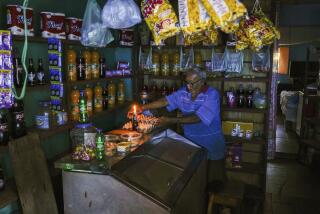Streets Blocked in Managua as Strike Spreads
- Share via
MANAGUA, Nicaragua — Thousands of anti-government demonstrators built barricades of paving stones and lighted bonfires in the capital Monday in defiance of a threatened police crackdown on a strike called by pro-Sandinista unions.
A Sandinista union official and witnesses reported at least one person was killed by gunfire in clashes between government supporters and Sandinista sympathizers. The reports could not be confirmed.
Some of Managua’s main streets were blocked, bringing the capital to a virtual standstill. The scene was reminiscent of the height of the 1979 revolution when the Sandinistas built roadblocks in their struggle to overthrow former dictator Anastasio Somoza.
Police were dispatched Monday morning to restore order. The police force is still dominated by Sandinistas, and it was unclear how decisively it would intervene.
A warning was broadcast every 30 minutes on state Radio Nicaragua saying police would act harshly against those causing disorder.
Meanwhile, the labor unrest caused widespread disruptions throughout Managua. Electricity and water service were cut off to most of the city of about 1 million residents. The capital’s airport was closed by an air traffic controllers’ strike.
Mail service and operator-assisted phone calls have been suspended since last week due to the strike.
Strike leaders claim that more than 80,000 public and private sector workers have joined the gradually spreading week-old walkout.
The strike was called in part to protest what the unions say are massive firings by the government of President Violeta Barrios de Chamorro. Workers are also demanding a greater voice in setting economic policy.
Hopes that ran high when Chamorro took office 10 weeks ago have faded as Nicaraguans realized that the economic crisis and bitter political divisions would not disappear quickly.
The government has said tough measures are needed to rescue the crumbling economy, including cuts in government subsidies, higher utility rates, privatizing state enterprises and the return of land confiscated under the Sandinistas.
More to Read
Sign up for Essential California
The most important California stories and recommendations in your inbox every morning.
You may occasionally receive promotional content from the Los Angeles Times.










